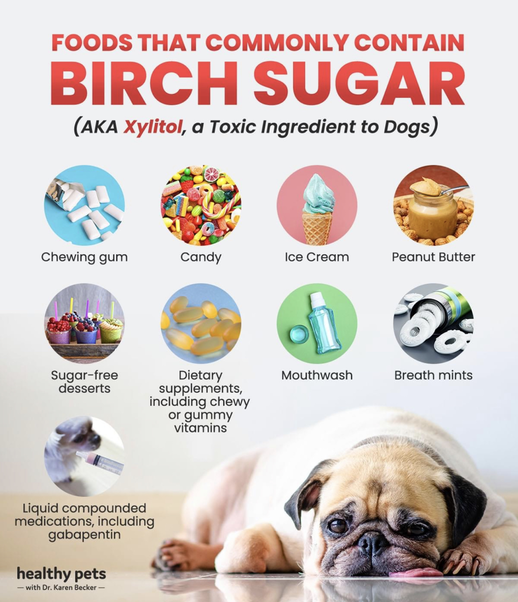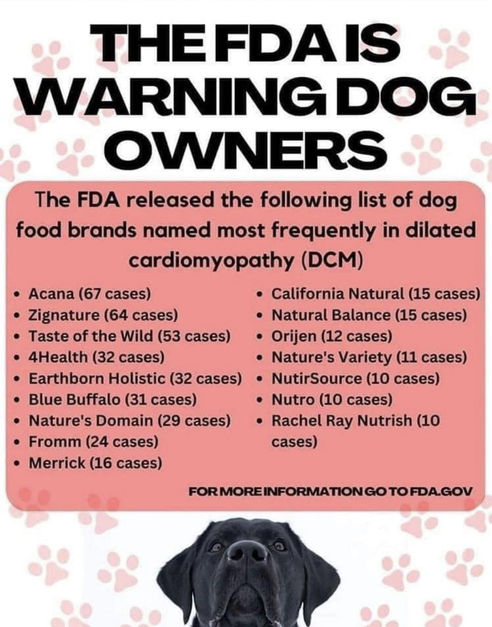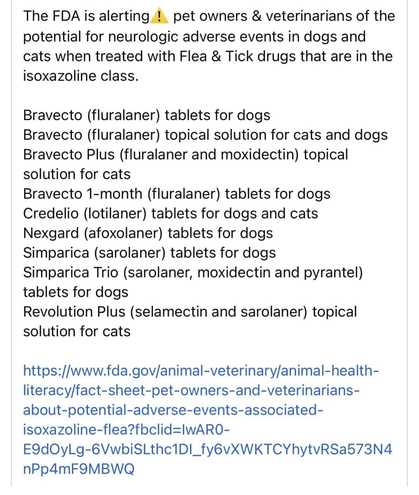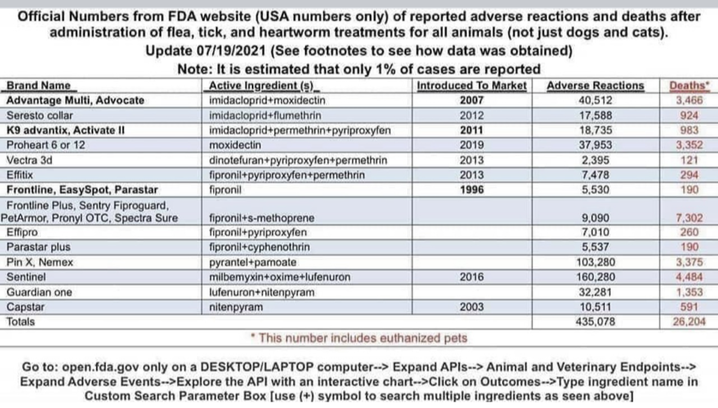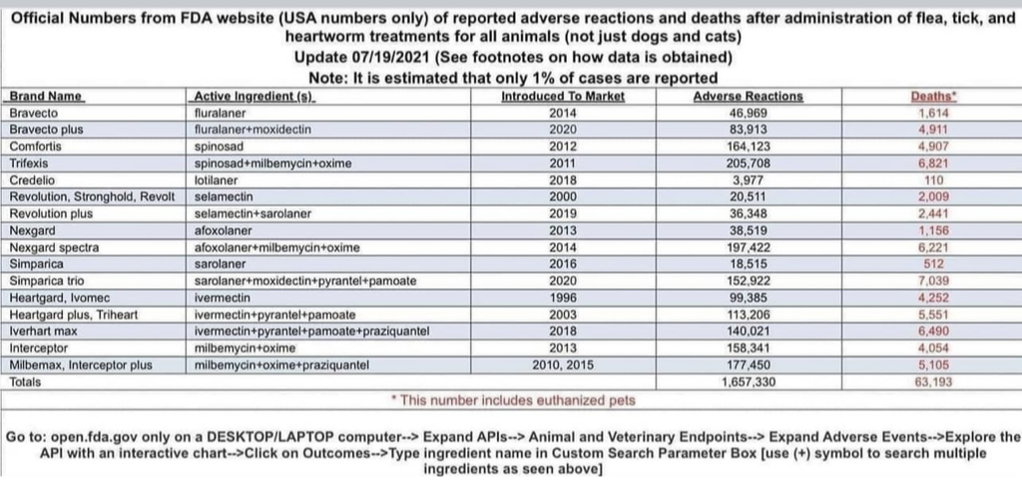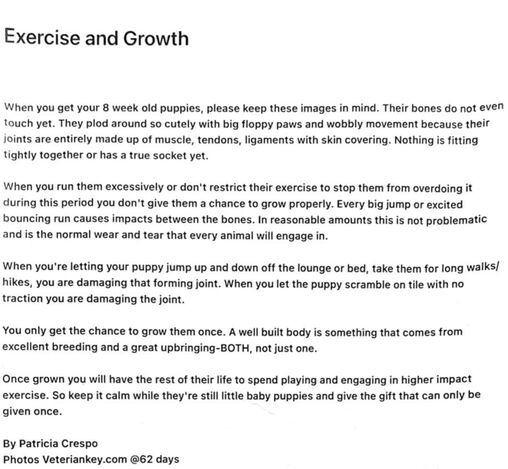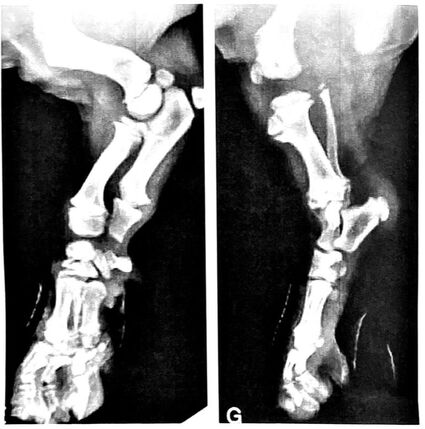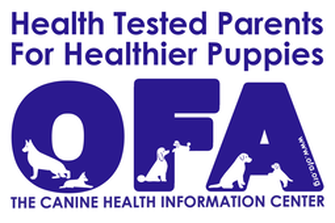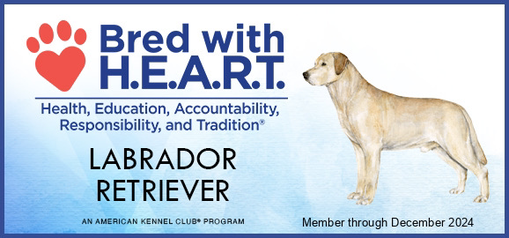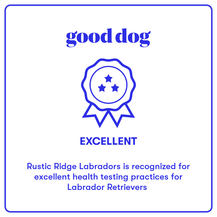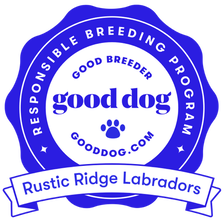HEALTH AWARENESS
Do NOT give your puppy or adult dog any form of Rawhide, Rope Toys, or Greenies.
Rustic Ridge Labradors NEVER RECOMMENDS giving puppies or adult dogs oral flea and tick medication. It can cause long term or life long neurological issues. Possible side effects are vomiting, lethargy, itching, excessive salivation, and seizures.
From Hartford Animal Hospital
At a cardiology conference this morning I learned that the nutritional information I have been giving my clients is accurate. Nothing new was revealed, but it is important to ensure that my information is correct. Canine dilated cardiomyopathy (DCM), a potentially fatal heart disease, has been occurring/recognized in low-risk breeds of dog since 2015. It was discovered that many of these dogs were fed "grain-free," boutique, nontraditional diets. Since that time veterinarians have been attempting to determine the cause of this unusual spike in DCM. Was it the absence of grain, the presence of other ingredients, or some other factor(s)?
Veterinary nutritionists and cardiologists, particularly at Tufts and U.C. Davis, have come to the conclusion that the problem is linked to the addition of PEAS, LENTILS, BEANS, POTATOES, and SWEET POTATOES to the dogs' diet. Soy and peanuts have not been implicated in the etiology of DCM in dogs. If these
foods are found within the top 10 ingredients in a dog food, it is a high-risk diet which could lead to DCM. Dogs with
DCM can be assymptomatic for years before they are critically ill. The good news is that DCM can be mostly reversed, if caught early, by changing the diet, eliminating the offending ingredients.
Please read your pet food labels, and stop feeding the sweet potato treats!
At a cardiology conference this morning I learned that the nutritional information I have been giving my clients is accurate. Nothing new was revealed, but it is important to ensure that my information is correct. Canine dilated cardiomyopathy (DCM), a potentially fatal heart disease, has been occurring/recognized in low-risk breeds of dog since 2015. It was discovered that many of these dogs were fed "grain-free," boutique, nontraditional diets. Since that time veterinarians have been attempting to determine the cause of this unusual spike in DCM. Was it the absence of grain, the presence of other ingredients, or some other factor(s)?
Veterinary nutritionists and cardiologists, particularly at Tufts and U.C. Davis, have come to the conclusion that the problem is linked to the addition of PEAS, LENTILS, BEANS, POTATOES, and SWEET POTATOES to the dogs' diet. Soy and peanuts have not been implicated in the etiology of DCM in dogs. If these
foods are found within the top 10 ingredients in a dog food, it is a high-risk diet which could lead to DCM. Dogs with
DCM can be assymptomatic for years before they are critically ill. The good news is that DCM can be mostly reversed, if caught early, by changing the diet, eliminating the offending ingredients.
Please read your pet food labels, and stop feeding the sweet potato treats!
Fast Facts on Flea and Tick Medications as of 08/08/2023
- The FDA is alerting pet owners and veterinarians of the potential for neurologic adverse events in dogs and cats when treated with drugs that are in the isoxazoline class.
- Although these products can and have been safely used in the majority of dogs and cats, pet owners should consult with their veterinarian to review their patients’ medical histories and determine whether a product in the isoxazoline class is appropriate for their pet.
- The FDA considers products in the isoxazoline class to be safe and effective for dogs and cats but is providing this information so that pet owners and veterinarians can take it into consideration when choosing flea and tick products for their pets.
- Isoxazoline products have been associated with neurologic adverse reactions, including muscle tremors, ataxia, and seizures in some dogs and cats;
- Although most dogs and cats haven’t had neurologic adverse reactions, seizures may occur in animals without a prior history;
- Many products are available for prevention and control of flea and tick infestations. Some flea and tick products are regulated by the FDA and some are regulated by the Environmental Protection Agency. You can discuss all options with your veterinarian to choose the right product for your pet.
- The FDA-approved drugs in this class are
- Bravecto (fluralaner) tablets for dogs
- Bravecto (fluralaner) topical solution for cats and dogs
- Bravecto Plus (fluralaner and moxidectin) topical solution for cats
- Bravecto 1-month (fluralaner) tablets for dogs
- Credelio (lotilaner) tablets for dogs and cats
- Nexgard (afoxolaner) tablets for dogs
- Nexgard Plus (afoxolaner, moxidectin, and pyrantel) chewable tablets for dogs
- Nexgard Combo (esafoxolaner, eprinomectin, and praziquantel) topical solution for cats
- Simparica (sarolaner) tablets for dogs
- Simparica Trio (sarolaner, moxidectin and pyrantel) tablets for dogs
- Revolution Plus (selamectin and sarolaner) topical solution for cats
- These products are approved for the treatment and prevention of flea infestations, and the treatment and control of tick infestations. Some are also approved for treatment and control of ear mite infestations and some gastrointestinal parasite infections, and a few are also approved for prevention of heartworm disease.
- If your dog or cat experiences any adverse event while using an isoxazoline product, first consult your veterinarian.
- The FDA continues to monitor adverse drug event reports for these products and encourages pet owners and veterinarians to report adverse drug events. You can do this by reporting to the drugs’ manufacturers, who are required to report this information to the FDA, or by submitting a report directly to the FDA.
- To report suspected adverse drug events for these products and/or obtain a copy of the Safety Data Sheet (SDS) or for technical assistance, contact the appropriate manufacturers at the following phone numbers:
- Merck Animal Health (Bravecto): 800-224-5318
- Elanco Animal Health (Credelio): 888-545-5973
- Boehringer Ingelheim (Nexgard): 888-637-4251
- Zoetis (Simparica, Revolution Plus): 888-963-8471
- If you prefer to report directly to the FDA, or want additional information about adverse drug experience reporting for animal drugs, see How to Report Animal Drug and Device Side Effects and Product Problems.
- Pet owners and veterinarians who have additional questions can contact [email protected] or call 240-402-7002.
- Additional InformationAnimal Drug Safety Communication: FDA Alerts Pet Owners and Veterinarians About Potential for Neurologic Adverse Events Associated with Certain Flea and Tick ProductsExternal Link Disclaimer
Safe Use of Flea and Tick Products
How to Report Problems with Flea and Tick
Information From -
The Natural Vets Website
The scary part about the isoxazoline class of drugs is that so far we cannot identify breed characteristics, age group, drug interactions, pre-existing conditions or genetic mutations as contributing factors to these reactions – they appear to be affecting pets randomly. Some reactions are mild, such as itching at the time of dosage which passes within a few days or weeks, to more severe, such as seizures.
We put a great deal of time and effort into our puppies to help insure they are confident and well adjusted. However, when they go to their forever families they will still experience times of fear and uncertainty. Rustic Ridge recommends not to baby your puppy during these times, but to reassure them that they are okay and bring them through any fear. Doing so will continue what we started, which is to have a confident, stress free, happy puppy. The bonus is that your puppy is learning he or she can trust you.
Rustic Ridge Labradors raises all of our Puppies on Purina Pro Plan Chicken and Rice Puppy under One Year
As adults we transition to Purina Pro Plan 30/20 Sport.
At the age of 8 we transition to Purina Pro Plan Bright Minds Chicken and Rice.
The Purina Products have served us and our Labradors well for many years.
Rustic Ridge Labradors NEVER RECOMMENDS GRAIN FREE FOODS.
As adults we transition to Purina Pro Plan 30/20 Sport.
At the age of 8 we transition to Purina Pro Plan Bright Minds Chicken and Rice.
The Purina Products have served us and our Labradors well for many years.
Rustic Ridge Labradors NEVER RECOMMENDS GRAIN FREE FOODS.
Crates are a great training tool! Your pup is in its happy place where they are safe, keep their best chew toy and favorite item to cuddle with for naps!
They learn to control their bladder as well as when it’s an appropriate time and place to potty once they get out of their crate. It’s a win for your puppy and a win for you. 🤗🐾💞
They learn to control their bladder as well as when it’s an appropriate time and place to potty once they get out of their crate. It’s a win for your puppy and a win for you. 🤗🐾💞
Please Be Aware of This Info!
All dogs require training starting from a young age. Labradors are known for their amazing temperament, however, they still require training. They want nothing more than to please their owners, they simply need clear rules and to know what is expected. That comes through training!
Rustic Ridge Labradors NEVER RECOMMENDS giving puppies or adult dogs oral flea and tick medication. It can cause long term or life long neurological issues. Possible side effects are vomiting, lethargy, itching, excessive salivation, and seizures.


